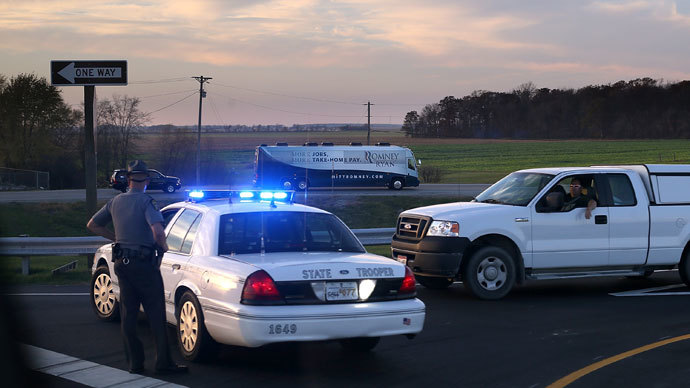Ohio police set up fake drug checkpoint to fool motorists

Can police officers trick automobile drivers with bogus traffic stops? Cops in a small Ohio town seem to think so, and now they’re under attack for trying to sweep the city of drugs using a creative little loophole.
The Mayfield Heights, Ohio Police Department is under fire after the city recently decided to establish a “drug checkpoint” on Interstate 271. Randomly stopping cars and combing them for contraband is illegal, though, so law enforcement has been using the next best thing: fake checkpoints.
Cops in the Cleveland suburb of only 19,000 have been placing warning signs ahead of a bogus stop and then monitoring the behavior of drivers. If any cars demonstrate suspicious activity after being alerted of the phony roadblock, police say that’s enough to stop and search them.
Police tried the trick last week when they erected signs reading "Drug Checkpoint Ahead," "Police K9 Dog In Use" and "Prepare to Stop." When they spotted cars trying to turn around, officers were deployed to find out why.
Dominic Vitantonio, an assistant prosecutor for Mayfield Heights, told the Cleveland Plain-Dealer that the local police department netted arrests and even seized drugs as a result of the unorthodox tactic.
"We should be applauded for doing this," he told the paper. "It's a good thing."
Others aren’t so sure, however, including one long-haired motorist who said he was singled out. Bill Peters, a 53-year-old heavy metal radio show host, told the Plain-Dealer that he pulled over recently after seeing one of the signs in order to check his phone for directions. As he was parked on the side of the road, police officers approached his car and asked if he was holding drugs. He wasn’t, and they didn’t find any either.
"The last time I checked, it is not against the law to pull over to the side of the road to check directions," Peters told the paper. According to Vitantonio, though, that gave police enough reasonable suspicion to investigate further.
"I see what they're doing, but I think it's kind of dangerous," Peters added. "It's one thing to do this on a 25 mph road; it's another on a busy interstate. I think it's a violation to just be pulled over and searched."
According to the Plain-Dealer, the Cleveland office of the American Civil Liberties Union is examining the fake checkpoint in order to find out if police are allowed to keep utilizing the trick. Legal experts speaking to the paper say it’s allowed, though, suggesting those traffic stops won’t be lifted anytime soon.
In 2000, the United Supreme Court ruled in Indianapolis v. Edmond that roadblocks conducted to "uncover evidence of ordinary criminal wrongdoing" are a violation of the Fourth Amendment, and therefore unconstitutional. Police can only stop cars randomly if they are keeping illegal aliens outside of the US and trying to combat drunk driving. Using deception, however, is something that is isn’t considered against the law.
"They can lie to anybody," Ohio State University law professor Ric Simmons told the paper.














